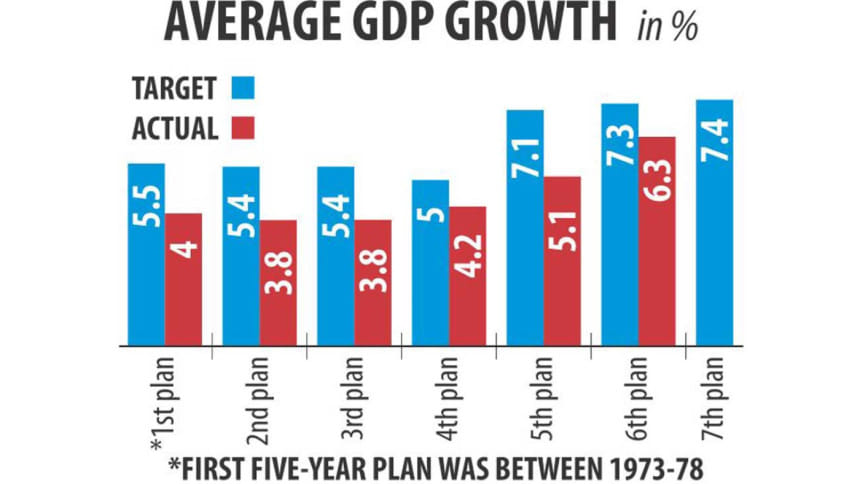Govt aims for better income distribution

The government has proposed a 7.4 percent average growth target in the next five-year plan aiming to empower every citizen by way of better income distribution.
The draft of the seventh five-year plan (fiscal 2015-16 to fiscal 2019-20) was placed yesterday at a consultation meeting chaired by MA Mannan, state minister for finance and planning, held at the auditorium of the National Economic Council.
At the meeting, the economists and bureaucrats stressed institutional reforms, higher investment and more resources for achieving the growth target.
Shamsul Alam, member of the General Economic Division of the planning ministry, said the GDP growth target will rise by 2 percentage points every year from fiscal 2015-16 to hit 8 percent at the end of the five-year period.
To meet the target, Tk 31.9 trillion will be invested, of which 90.4 percent will come from domestic sources and 9.6 percent from external ones.
Alam said the cardinal theme of the next plan is “accelerating growth, empowering every citizen”.
Emphasis will be placed on improving the growth drivers and on policies, institutions and programmes that will support the lowering of income inequality, he said.
Cabinet Secretary Musharraf Hossain Bhuiyan said financing is important to achieve the target, which was not reflected much in the draft plan.
Both official development assistance and bilateral loans will be needed but attention must be paid at the hidden costs of the bilateral loans.
He cited the case of a couple of bilateral loans taken by the government in recent times. Although the interest on them is low, they come with procurement restrictions, which ultimately drive up the cost of the loans.
The procurement must be made from those countries and they may not be the most economical options.
“That means these are a type of tied loans. The financing cost for them cannot be considered just by looking at the low interest rates.”
Subsequently, he called for a guideline for reviewing the loan proposals in the draft plan such that the ministries and divisions can holistically assess the costs and benefits.
To shift to the higher growth trajectory, institutional reforms must be made, the cabinet secretary said.
Strengthening the institutions must be given the utmost importance, particularly the local government ones. “However, it does not mean that resources have to be transferred from the centre to the local government.”
To empower all citizens, both the human rights and information rights commissions must be strengthened, Bhuiyan said.
The cabinet secretary went on to refute the various criticism fired at the civil service reforms, citing two concrete examples.
The secretaries of 48 ministries and divisions signed a performance management contract with the cabinet secretary for the first time. Under this, they are being given various governance and service delivery targets against which they are evaluated at the end of the year.
The government has also prepared a national integrity strategy document, which is being acted upon slowly but steadily.
“Now, if we go about with Jihadi enthusiasm from the onset, it will become just an abandoned document. We will have to go ahead considering the political feasibility,” Bhuiyan added.
Mahabub Hossain, former director general of Bangladesh Institute of Development Studies, stressed agriculture, as the sector's growth impacts the overall growth rate.
He called for measures that would ensure the farmers get good returns, such that agricultural growth soars and along with it, the overall growth.
Nasiruddin Ahmed, former chairman of the National Board of Revenue, said to increase revenue collection there has to be a link between research and policy.
Ahmed said it is not true that Bangladesh could never achieve its revenue target, while citing fiscal 2010-11 and fiscal 2011-12 as examples.
The revised targets in both the years were more than the original ones and yet the collections crossed the marks.
BIDS Research Director Rushidan Islam Rahman and Senior Research Fellow Nazneen Ahmed, Bangladesh Bank Chief Economist Biru Paksha Paul and Centre for Policy Dialogue's Research Fellow Toufiqul Islam Khan also spoke.

 For all latest news, follow The Daily Star's Google News channel.
For all latest news, follow The Daily Star's Google News channel. 



Comments